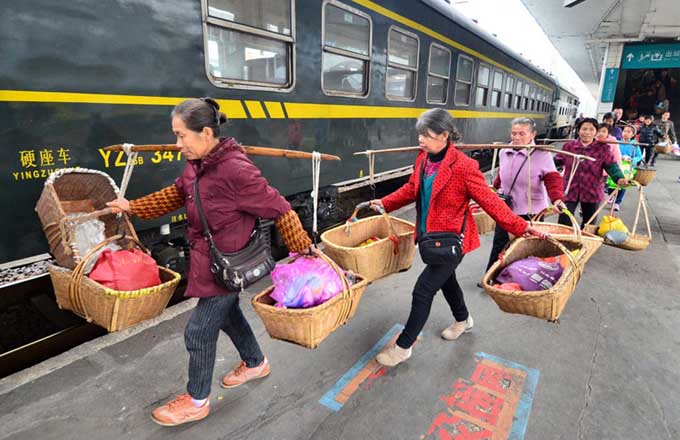'Xinjiang class' helps to mold tomorrow's leaders, deputy says
More students from the Xinjiang Uygur autonomous region should be sponsored to be educated in more-developed provinces and regions to enjoy top teaching facilities and methods, a deputy to the National People's Congress suggested.
"For students from Xinjiang, especially for those coming from the families of herdsmen and farmers, studying in local schools is like learning to swim in a lake, while receiving education in Beijing is like learning to surf in the ocean," said Abudurehep Turmniaz, an NPC deputy from the Xinjiang delegation.
He is also dean of the Xinjiang Islamic Institute, and was speaking while visiting the "Xinjiang class" at Yangzhen No 1 Middle School in Beijing's Shunyi district on Sunday.
"With recourse to the best education, the students can see the world better and think deeper. Their future is the future of Xinjiang," he said.
Bai Wenliang, head of the school, said its senior-level department accommodates more than 890 students from all parts of Xinjiang — the most among the nine high schools that have a "Xinjing class" in Beijing. The majority of the students are from the Uygur ethnic group, Bai said.
The Ministry of Education has been running the "Xinjiang class" program since 2000. By 2012, more than 51,000 students had studied in senior high schools in 44 cities nationwide free of tuition fees, according to the office in charge of the program in Xinjiang.
Although the annual enrollment numbers for the program increased from 1,000, to 8,330 in 2012, Abudurehep believes the numbers should be higher and will file a proposal on the issue during this year's conference.
He also suggests students from rural areas should be given more opportunities. In 2012, more than 77 percent of the students who enrolled in a "Xinjiang class" around China came from rural areas, with 90 percent from ethnic groups, such as Uygur and Kazak.
Abudurehep told the students to treasure the opportunities of having the best education facilities and teachers so they could become the backbone of Xinjiang in the future. He also gave students dried fruit he brought from their homeland more than 2,400 km from the capital as a gift.
Kalby Nur, 18, couldn't contain her excitement when Abudurehep spoke to them, not because he is an NPC deputy, but because he talked in the Uygur language with the accent of Turpan — her hometown.
She has one more year before applying for university. "I want to study abroad. My dream destination is the UK. I would never have thought about it back in Xinjiang."
All students from the "Xinjiang class" at the school will spend a year preparing for senior-level studies. "Mainly, we improve their spoken and written abilities in Mandarin. We then mix them with the rest of the local students. Some of the Xinjiang students have even become an inspiration for others because they can speak four languages — Mandarin, Uygur, Kazak and English," Bai said.
The college entrance rate for the "Xinjiang class" has been maintained at 100 percent since the school started running the program in 2005. The school also built a canteen catering in halal food for the Xinjiang students.
Junior high school students in Xinjiang can apply for this year's "Xinjiang class" from March 10 to April 10 and students from less-developed southern Xinjiang will enjoy a preferential policy.
Kalby said: "I was top of the class in my school in Xinjiang, but now I find it a bit difficult to catch up.
"Some of my classmates ask me to teach them the Uygur language and dance. They also always invite me to their home on weekends because I can only go home once a year. They are my family here."
Contact the writer at [email protected]























